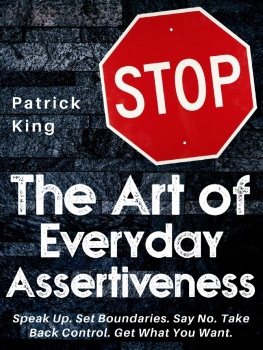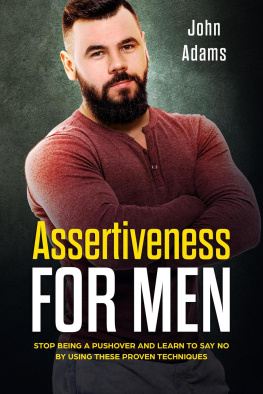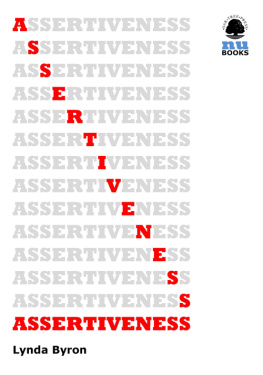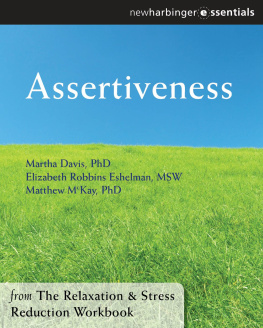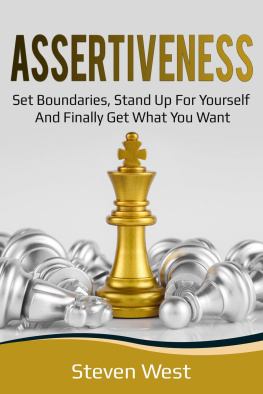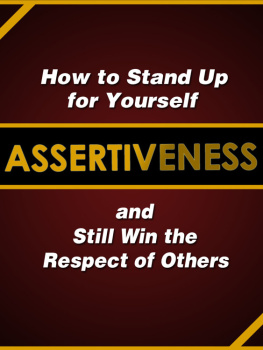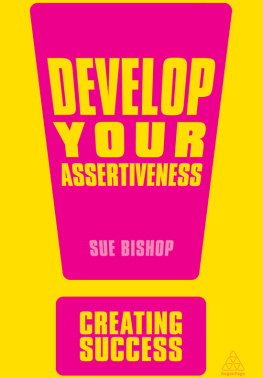Table of Contents
The Art of Everyday Assertiveness: Speak Up. Say No. Set Boundaries. Take Back Control. Get What You Want.
By Patrick King
Social Interaction Specialist and Conversation Coach
www.PatrickKingConsulting.com
As a FREE show of appreciation to my readers, Ive got TWO great resources for you:
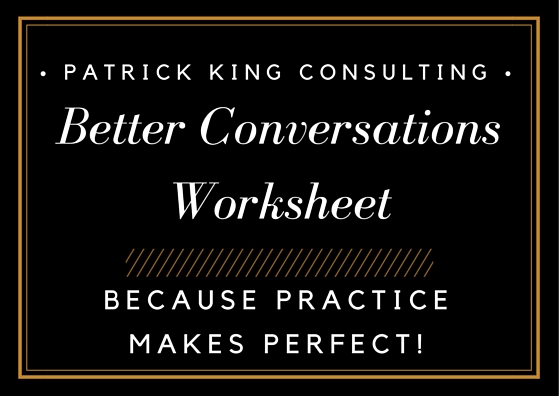
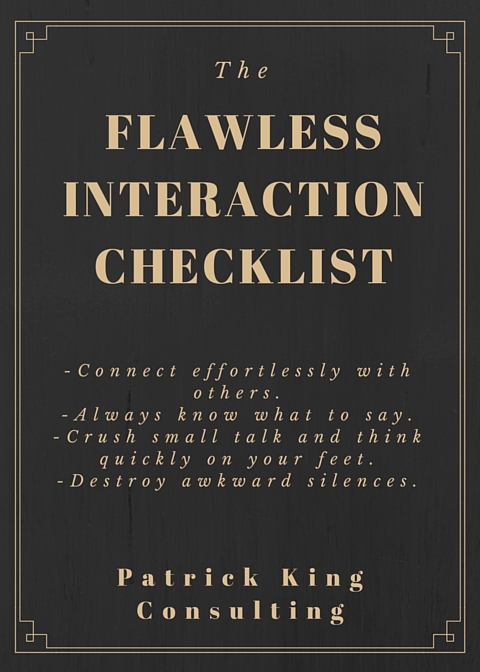
>> CLICK HERE For The Flawless Interaction Checklist and Better Conversations Worksheet! <<
The Checklist describes in-depth the 7 essential components to exceptional interactions and conversations between you and everyone from a stranger to your partner and The Worksheet puts a few of those components to the test with practice exercises that will instantly upgrade any conversation.
Learn how to :
- Make people comfortable
- Connect easily in any context
- Develop killer eye contact
- Prepare for any social situation
- Appear as intuitive as a mind reader
- Never run out of things to say
- Practice and drill all of the above
CLICK HERE to download your FREE copy now !
Table of Contents
Chapter 1. The Balance of Assertiveness
Asserting Your Needs
Your Personal Bill of Rights
Chapter 2. Damaging Beliefs and Damaging People
Toxic Beliefs
BLUE Your Beliefs
Chapter 3. How to Ask for What You Want and Get It
They Should Have Known
Symbolic Value
Passive-Aggressiveness
Becoming Assertive the Right Way
Chapter 4. How to Say NO Without Tension
Chapter 5. Asserting Boundaries
Choosing and Enforcing Your Boundaries
Toxic Takers
Chapter 6. Understanding Your Patterns
Communication Self-Assessment
The Need To Apologize
Chapter 7. Assertiveness Action Plan
Summary Guide
Chapter 1. The Balance of Assertiveness
What does assertiveness mean to you? I can tell you what it means to me: freedom.
Its not necessarily freedom from others or from the obligations in my life, but assertiveness is the freedom to choose what I want to do and not be beholden to people, places, and things.
It might sound insignificant, but its absolutely not. Its analogous to the difference between feeling like youre drowning versus treading water effortlessly. And if it sounds familiar, then welcome to the first step in taking back your time, energy, and life.
Im a recovering people-pleaser, passive person, and overall doormat. I realize now that I acted in this manner for a few reasons. First, I didnt know that it was okay to say no to people. Second, I felt like people would hate me if I disagreed with them. Third, I literally didnt know the words to use. These things sound almost silly to read back as I write them, but I know Im not alone in themIll dig into these factors deeper in later chapters. I wrote this book as much for me as for you.
Becoming an assertive person who knows how to stand up for themselves takes far more than a few simple phrases in the guise of communication skills. It requires a deep look into the relationship you have with others, and more importantly, the relationship you have with yourself.
Thats why youll go to extreme lengths to avoid conflict, unable to express yourself clearly and fairly without your emotions sabotaging you. Thats also why youll beat yourself up for being such a pushover, losing your temper, or following orders against your better nature.
Assertiveness is, in theory, as easy as saying those simple phrases: No, I dont want to, and Are you trying to take advantage of me? But in practice, its one of the most difficult lines to tread. How can you get your message across without insulting or enraging others? Is there a way to balance your needs with the requests of others?
Lets take a look at a scenario that is likely familiar, from one perspective or another.
Three friends had been meaning to meet up, so Keisha booked a table for dinner that night. She ordered the most expensive meal because her promotion allowed her to treat herself. Michael hadnt told them he was recovering from gastric flu and didnt order food, excusing himself, sweating and shaking, to throw up halfway through the meal.
Gita had paid out for unexpected car repairs that day and, hiding a gasp when she saw the prices, just ordered a side dish so she could afford a much-needed drink.
When the bill came, Keisha told the waiter they would split it three ways.
Michael resented paying for their food when he should have been at home in bed, but he agreed, not wanting to disappoint Keisha. Gita, probably helped along by the house wine on an almost empty stomach, passive-aggressively groused that Keisha was too controlling and they should have cancelled. There was palpable tension in the air until things became obvious and plain.
Why didnt you both just say? Keisha asked as she theatrically paid for the entire meal amidst protests that turned into deafening silence. That was the last time they met up as friends.
Most people can remember a time when they have played the role of Keisha, Gita, or Michael. Assertiveness would have been a very welcome fourth dinner guest.
Michaels passive behavior stemmed from feeling too guilty to tell Keisha he wasnt well enough to meet up; he felt obligated to make it out. Gita was ashamed of her financial situation and fearful of judgment, which bubbled into mistrust of Keishas intentions. Despite Keishas outward appearance, her low self-worth fueled her aggressive behavior surrounding where, when, and how they ate together.
Have you been any or all of these people on some occasion?
Assertiveness allows you to let people know where you stand, but in a way that doesnt change your relationship, and doesnt attach negativity to the situation. If those things do happen, it wont be because of your actions or words.
Think of assertiveness as a bubble protecting your values, availability, capability, and needsyour confident bodyguard who stops things from spiraling out of control. Being assertive is calmly standing up for your rights and respectfully influencing others in potentially stressful situations.
Again, it seems as easy as just speaking a few phrases directly and without subterfuge, but we instinctually know that people are anything but predictable or logical, so its never that simple. How do you suppose Michael, Keisha, or Gita would react to an assertive pushback? We can never imagine it going well, though there are many ways to smoothly and strategically speak your mind. Whatever the case, its this assumption that keeps us quiet until we reach our breaking points.
One way to make assertiveness easier is to have remind ourselves of what were missing out on in our liveswhats at stake. It is anything but trivial, and it compounds on a daily basis if you dont speak up.
Asserting Your Needs
We all have needs, psychological or physical, and the inability to be assertive means your needs will often go unfulfilled. On a short-term basis, this is acceptable and sometimes even necessary. Sometimes we choose to downgrade our needs in favor of someone elses more pressing matters. But the vast majority of the time, are we really making that choice, or do we simply feel handcuffed by our inability to express ourselves as we want?
Needs are a big part of who you are: they are the indulgent daydreams of your deepest desires, what you wish for when you toss a coin into a fountain or see a shooting star, or the goals you enter into a journal on New Years Day. They are everybodys driving force, and unmet needs create feelings of anxiety, hopelessness, and unhappiness.

